#BLACK COMPASS MEDIA
Text
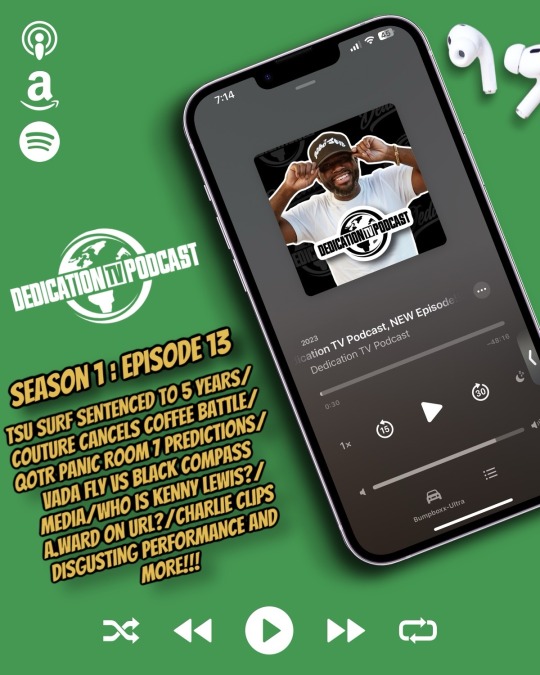
🚨 New Episode Alert 🚨
🎧 #DedicationTvPodcast Episode 13 🎧
TSU SURF SENTENCED TO 5 YEARS/ COUTURE CANCELS COFFEE BATTLE/QOTR PANIC ROOM 7 PREDICTIONS/VADA FLY VS BLACK COMPASS MEDIA/WHO IS KENNY LEWIS?/A.WARD ON URL?/CHARLIE CLIPS DISGUSTING PERFORMANCE AND MORE!!!
Available On All Podcast Streaming Networks‼️
Apple - https://podcasts.apple.com/us/podcast/dedication-tv-podcast/id1707968820?i=1000637411933
Spotify - https://open.spotify.com/episode/51s0BS93ZHqJjyTnwYEqUD?si=-QYqfyyBRd65acUQl4xz7g
YouTube - https://youtube.com/@DedicationTV_?si=BDow_gQGYtjjpiUT
#DedicationTv
#tsu surf#QOTR PANIC ROOM 7#URL TV HOMECOMING 2#A.Ward#REMY MA#CHROME23#BLACK COMPASS MEDIA#VADA FLY#VADA FLY KENNY LEWIS#AYE VERB#charlie clips#dedication tv podcast#dedication tv
0 notes
Note
did people actually say “what did jolon do wrong” thats evil
Yes actually. Someone did unironically word for word ask if what Jolon did was "truly evil" or not. I am not making this up. Lmao.
#the bitter ocean talks#the bitter ocean rants#its not lost on me that some people show more sympathy for the explicitly shown white bad guy that has racist ideology#but treat falst one our main protagonists who was literally the victim in this situation with noticeably less compassion. and hes black.#idk in general nowadays for the most part people are smart and have media literacy but earlier years of the fandom it was a fucking mess#like the most striking to me was certain people in auroracord trying to excuse/justify/sympathize galen. EVEN AFTER THE BACKSTORY REVEAL.#anyway its so awesome and cool being black in fandom. (lie) i am so happy and enriched and not on the verge of biting someone always. teehe#anyway thanks for the ask#i am not main tagging this shit lmao#cw racism#cw medical malpractice
6 notes
·
View notes
Text
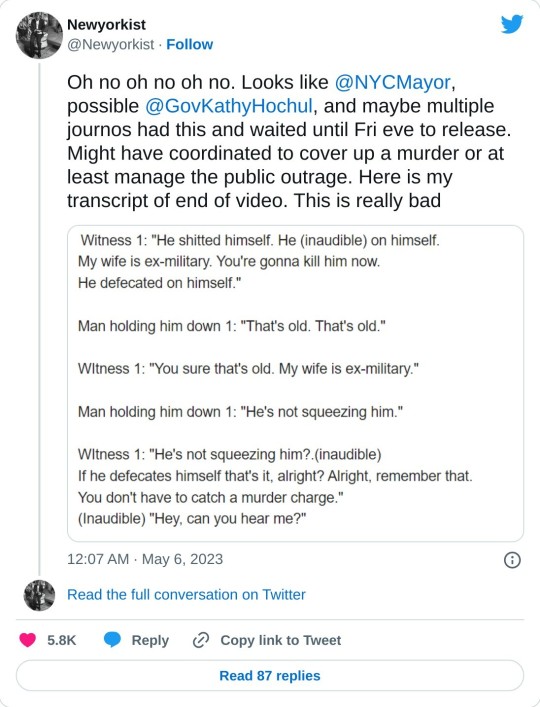
The media,
@NYCMayor
and
@GovKathyHochul
tried to protect a murderer.
Shameful.
These two “leaders” in New York need to either step down or get voted out of office
NYC I love you but you could have Tish James as your governor and Maya Wiley as your mayor.
#Homeless people need compassion and help.#jordan neely#daniel penny#blacklivesmatter#journalism fail#media bias#black lives matter#reblogview post#blm#homelessness#sigh#true crime#these pos motherfuckers refuse to see the compassion of black folks who are mentally ill and homeless#if you don't see the compassion of them you can happily go die in a fire#seriously kill yourself rn#you disgusting#selfish#disgusting fuck#if you agreed with this shit#you can die in a fire#i'll even light you the fuck up#on god#And I’m so serious
19 notes
·
View notes
Text
whenever someone makes a post about the most dumb bad faith criticism of something i always just sit and think
you can say lily orchard. its okay. you can say her name. she is bad at media criticism. i feel we can all admit it.
#i dont like the transphobic shit directed at her#i just find her media takes. absolutely bottom of the barrel.#she's a hypocrite half the time#and the other half she has the. dumbest black and white morality takes#but i also cannot decipher her actual moral compass#i would like to say she needs to branch out outside of children's media#but tbh i dont think she is ready for that.
3 notes
·
View notes
Text
there's something magnificently terrible in stories that are so afraid of death that they'll invent a horror a thousand times worse and call it mercy
#this is why i watch so much stuff from china and thailand >:TTT#well. this was a read but its...so western#thailand and china have their own issues but they do not carry that stark black and white morality predominantly christian cultures do#this is a story thats supposed to be predominantly about hope and mercy and instead its just horrifying#in condemning violence and death completely they instead made a story where any level of violence or death is held to the same degree#and its 'heroes' need to avoid them at all costs#to the point where the lengths they take are more horrifying than the 'terrible' choices theyre avoiding#this isnt new im just reeling extensively#years of primarily asian media and then i try coming back to some western stories and. PHEW.#no thank you#im going to go cradle farscape instead now#a story of fuckups yet it understands compassion and faith in the face of bleakness so much more#q*
4 notes
·
View notes
Text

“Protesters in New York City exhibit unwavering resolve to bring the metropolis to a standstill in response to the state-sanctioned execution of Jordan Neely. The vigilant citizens of Gotham City possess a profound comprehension that, despite the presence of a Black Mayor and Police Chief holding esteemed positions, it is the insidious and overpowering force of white supremacy that dictates the course of justice and whether it shall prevail.” -Rahiem Shabazz
#Instagram#Fuck Daniel Penny.#Homeless people need compassion and help.#jordan neely#daniel penny#blacklivesmatter#journalism fail#media bias#black lives matter#reblogview post#blm#homelessness#sigh#true crime#these pos motherfuckers refuse to see the compassion of black folks who are mentally ill and homeless#if you don't see the compassion of them you can happily go die in a fire#seriously kill yourself rn#you disgusting#selfish#disgusting fuck#if you agreed with this shit#you can die in a fire#i'll even light you the fuck up#on god#And I’m so serious
3 notes
·
View notes
Text
Ten thousand TRILLION percent yes T. Be a real human Social Media is not even ‘real’ nor is it everyone’s outlet, the be all and end all for where feelings and opinions live and die be your own human have your values live true to them fuck everyone with two thumbs and a social media account who can’t mind their own business. She’s a wonderful person with a ginormous heart and strong values she does not ever have to justify or be a spokesperson for every single cause on this planet. Being real and actioning real change and conversations off line is is important do people really think saying the same sentence as everyone else on social media is actually going to single handedly change anything NO it takes actual physical action and using your brain not your thumbs on Twitter. These platforms are built precisely for hiding your true self and being fake there is next to no sincerity in simply typing the same words everyone else is just to seem empathetic.. it’s not.
45:00 onwards
#@everyone haraasing her behind a phone screen for not speaking out abt Ukraine#she sent a freaking hand written not and her barbie to a lil Ukrainian (I’m guessing refugee) for Xmas#it would be devestatin for her and so many athletes she knows#she has friends and relationship with people on both/all sides of that conflict#uggggg yes T thankyou for being a real human and having human feelings and responses to these matters#T shows her love and compassion through actual human interaction and is not a Twitter mouth piece#fuck I hate people#not her. she’s wonderful and a precious bby angel#she’s such an old soul I love she values actually human connection and hasn’t become fake arse socialite#a rant abt social media#fuck Elon#nothing to do with this interview just fuck Elon#but making it about her own IG account is not gonna stop poots or stop violence against black people#*poots = Putin#also would this wan pls stop talking abt ‘YANNICK’#*woman#t isn’t spending the whole time talking abt Morgan or Scott..#ugh people don’t know how to have conversations#this is a once sided convo T is doing all the work here#yes my princess#I’m legit so grateful T doesn’t give two shits about people on social media
2 notes
·
View notes
Text
Picked up another book called Me and White Supremacy by Layla F. Saad. This is part of the foreword by Robert Diangelo (author of White Fragility):
"In my effort to answer to the question of what to do next, I have begun to ask a counter question: “How have you managed not to know?” In the era of Google and social media, the information on what white people can do about racism is everywhere, and BIPOC have been telling us what they need for a very long time. Why haven't we sought out the information on our own up until now? Why haven't we looked it up, as we would have done for any other topic that interested us? Asking white people why they don't already know the answer is meant to be a challenge to the apathy about white supremacy that I have come to believe most white people feel. But it is also a sincere question. If we actually made a list of why we don't know what to do, we would have a guide for moving forward. Nothing on that guide would be simple or easy to change, but change would be possible. Your list might look something like this:
I wasn't educated about racism.
I don't talk about racism with other white people.
I don't talk about racism with the People of Color in my life.
I don't have People of Color in my life.
I don't want to feel guilty.
I haven't cared enough to find out
Layla F. Saad has given us a road map for addressing each of the above points, as well as for addressing all of the dynamics I have raised, and more. This book is a gift of compassion from a brilliant Black woman willing to guide you through a deep examination of white racial conditioning in service of your liberation. Me and White Supremacy is an extraordinary new resource for white people willing to align what they profess to value (racial equality) with their actual practice (antiracist action). In a clear and accessible way, Saad has answered the question. Now, each time I am asked by a white person, "What do I do?", my answer will include "Work through this book."

I got it off of Libby
526 notes
·
View notes
Text
Unfortunately I came across a very strange and misinformed video about Black Butler.

It’s not good. Don’t watch it. Unless you wanna ruin your day, in which case have fun.
Despite it all, I watched it. What left me wondering, however, was how off the mark the person who made the video was on, well, everything.
From their insistence that the Book of Circus Arc theme or point is non existent, to reading Ciel’s character so badly they genuinely thought the Green Witch Arc did nothing for his character development.
While baffled, it also made me think on how someone could read Black Butler so badly.
Sure, you can say that there’s no real way to read or interpret something “in the wrong way” but interpreting The Hunger Games as a pure battle-royale action story would make you believe it’s bad.
“Why are we focusing so much on how the capitol preps them?” Or “Why isn’t Katniss winning everything?” Or “I wanna know more about the rebellion” All questions that miss the actual point of the story - which is criticizing (not solving or ignoring) the way that media distracts us from violence via spectacle.
The same thing applies here. While there is no “right” way to consume media, there’s things that the author makes clear they wanna focus when creating a story. Things that, if you understand, make the story you’re reading actually make sense.
And in Black Butler there’s three things that you have to understand to properly get what Yana is saying.
Sebastian is the protagonist
Ciel and Sebastian’s relationship IS the story.
And that relationship is, fundamentally, a positive one.
A quicker version of it would be:
Black Butler is a love story from the POV of Sebastian, and you have to ship it to get it
- but that’s not entirely true.
You can still look at it as a complex but ultimately positive rship and get in broad strokes of what it’s conveying. It doesn’t have to be romantic. Although, it helps much more than a platonic framing.
(That said, interpreting their rship as father and son, still isn’t the best way to go about it. Mostly because by its very nature of “soul consuming” their relationship is extremely sexually charged. And hey, if you’re into that I don’t judge. However, if you’re desperately trying to interpret their rship as NOT romantic to the point you fall back on heteronormative patriarchal ideals of nuclear familiar as framing device, I don’t think this interpretation bodes with you)
Now, having all that ground work:
Why do I say these are the key components to understand BB?
Okay so, first,
1. Sebastian is the Main Character. The protagonist.
There’s a lot of people who wanna argue against it, claiming he’s either the villain or the antagonist. Both wrong.
He does not function as an antagonist. Even if, and an emphasis on if, you consider Ciel to the protagonist, Sebastian isn’t a narrative antagonist.
If you wanna go back to Creative Writing 101, be my guest. An antagonist is directly defined by the protagonist. It’s the opposing force. If the protagonist wants A, the antagonist wants to stop them from getting A.
Sebastian’s catchphrase is “Yes, my Lord”. He never opposes Ciel, in fact quite the contrary. By the mere fact they’ve created contract, it means that they’ve both agreed in the inevitable outcome.
People want to frame Sebastian as the villain, because Ciel having his soul taken by a demon, would be a BAD END in the context of their moral compass. They see Ciel as a frail victim of abuse, who’s being tricked by Sebastian, who wants Ciel’s soul.
Which is an. Interpretation. A bad one. But still one.
The narrative (and whether the narrative fits your personal moral compass and lack of critical thinking is irrelevant) treats Ciel as an agent in his own destiny. The abuse he suffered was the moment in which he had no control. It’s only after he meets Sebastian that he can rid of both his guilt and his despair, and do what he wants.
In this case though, it’s revenge.
The famous “Asthma” scene shows this. If Ciel is taken back to his past, he becomes helpless. Swarmed with pain and memories that make it so that he can’t even react. Sebastian is his saving grace. If Ciel didn’t have him, and the power he wields to rebuilt what’s broken, he would crumble once more.
If Ciel has a panic attack, because of all the pain he has, Sebastian picks him up and says “you are not a helpless child anymore, you are not a victim anymore, you have the power to do anything. So, what do you wanna do?”
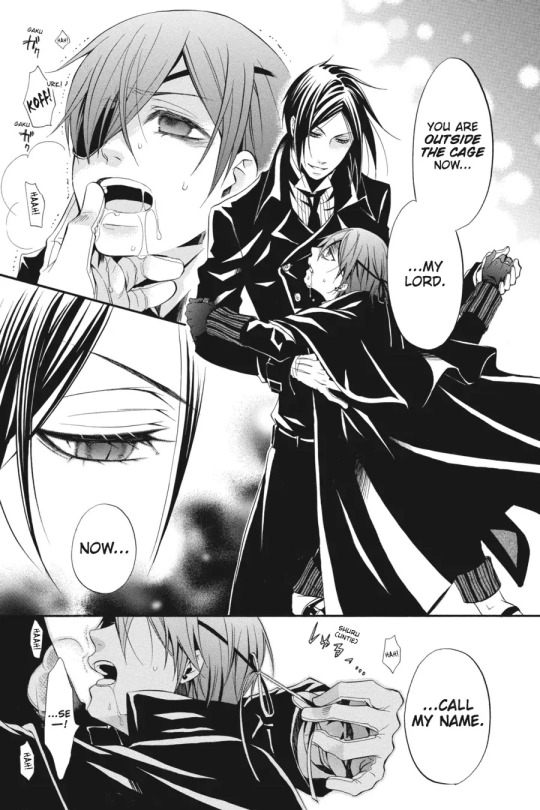
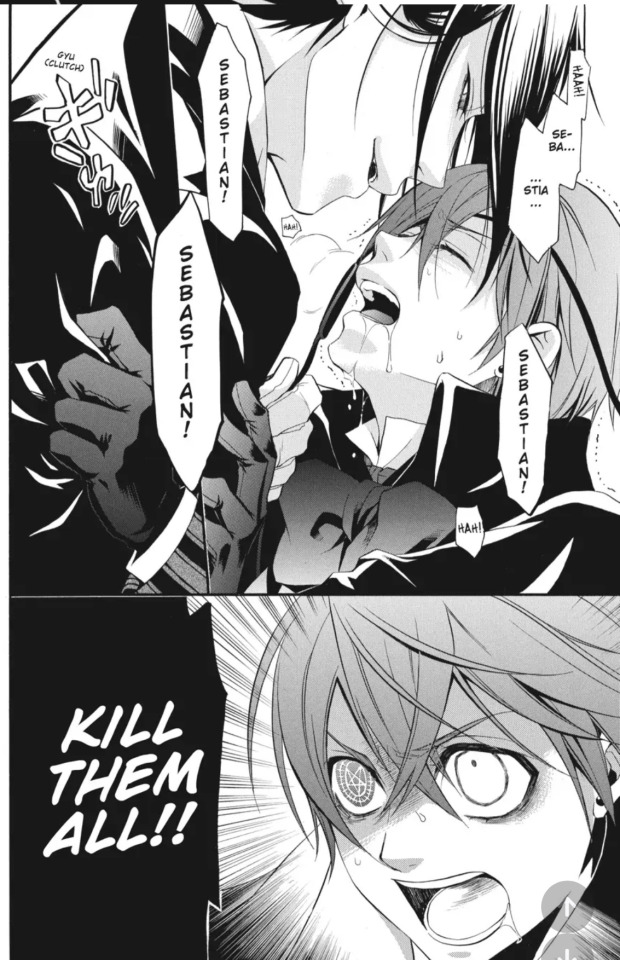
Ciel’s answer is to kill them.
A proper analogy would be to say that, if Sebastian offers a gun, Ciel pulls the trigger. They are both at fault. Sebastian, strictly speaking, is not here to directly cause Ciel’s downfall, but as a tool Ciel uses to plunge into the abyss.
If, again if, you were to frame Ciel as a protagonist, Sebastian falls closer to the “Voice of reason” character. Not a literal voice of reason, but a literary one. If you have a protagonist and an antagonist exchanging ideals, the Voice of Reason serves to engage with the protagonist on their own ideals.
That said, Ciel isn’t the protagonist. The story quickly falls apart if you interpret it as such.
Things such as Ciel’s character arc being…shall I say odd?
It’s not that his character arc isn’t there, but it’s never lineal. His goals stay the same, the only thing that happens is that we start to peel back the “why”s of his goals. Throughout the series it’s never about Ciel understanding himself better, he knows who he is, he knows what he wants, he knows why he wants it. He doesn’t ever need to uncover these, but simply remember them. Because it’s always about the audience understanding Ciel.
He knows he wants revenge.
In the Circus Arc: He knows that he needs Sebastian because without him, the pain of the abuse he suffered would be too much to bear. But WE are introduced to it.
In the Book of Atlantis: He knows that with this new lease he does not want happiness and peace, he wants revenge. The one being told this is the audience.
In Green Witch Arc: He knows that their revenge isn’t for his family, the real Ciel or guilt. It’s because he wants it. He’s angry, he’s upset, and this is entirely for him. The one being told this is the audience.
Except. Not really. The one either discovering or remembering these key moments - is always Sebastian.
Sebastian is the one who reassures him that he now holds the power of a demon to override the pain. Sebastian is the one who remembers that to override that pain, Ciel wants revenge. And Sebastian is the one who discovers that that revenge isn’t built out of grief or guilt, but for himself.
We are witnessing it all, through the eyes of Sebastian.
This is why we have an extremely vague idea of who Ciel is, Sebastian does not have the whole picture.
If you haven’t been reading this manga with your eyes closed, you’ll realize we have a better grasp at Sebastian’s character than that of Ciel. We get a lot of insight on how he thinks and what he values through light hearted dialogue he has with the servants. You even see the character development in these little interactions.
Think about how when he first arrived to the mansion he magically created food with no regards to taste, but when he meets Bard he states that food is created to see whoever will eat it, smile.
That is character development, more than you will be able to see from Ciel.
Because Ciel’s character, while not static, doesn’t go from point A to point B. Mostly, cause it doesn’t need to. He went through that when he lost the real Ciel and got Sebastian. Everything we are watching is the falling out.
Now, given the fact that I’ve told you that it makes more sense for Sebastian to be the protagonist/main character, and that he 100% isn’t either a villain or antagonist in ANY of the interpretations you can get:
Do you believe me?
If you don’t, you’ll probably believe Yana herself.
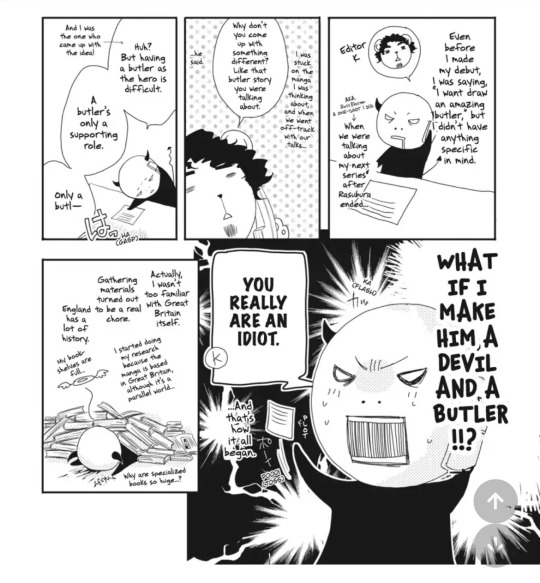
This is from the first Volume, where Yana herself describes the process of making Black Butler. The primary idea behind the creation of BB was a butler as a “hero”.
If you go back to the introductory chapter, you notice that Ciel is barely mentioned. He’s simply the one to give Sebastian impossible tasks and standards that Sebastian must find how to overcome.
Ciel is properly introduced until the NEXT chapter. The second chapter has this formula too, introducing Lizzie as a problem to overcome. Although, to Sebastian the best way to “get rid of the problem” is simply to indulge her.
The issue here being that the problem isn’t as simple as a business meeting but something directly tied to Ciel and Ciel’s past. Each time that Sebastian has to solve a problem, it chips away at Ciel. While with Lizzie he shows a persona, once he’s alone with Sebastian he acknowledges the toll it took on him. It serves to build Ciel as Sebastian’s master, and how some problems aren’t as simple as discarding a tablecloth.
The third and the fourth, are a unified narrative, with a similar premise to the first chapter. Ciel gets kidnapped and Sebastian must find a way to retrieve him without raising suspicions.
If the first chapter is to set up what Sebastian must do as a butler, the third and the fourth serve to set up what he must do as a demon.
The entirety of the volume, and up to Book of Circus Arc, is about how Sebastian tries to follow the increasingly absurd orders that Ciel has - it is not about Ciel trying to solve them.
That’s how they work, we follow Sebastian for the most part, because he’s the one having to come up with the solutions.
If anything, in early Kuro, where the emphasis was more on a slice of life conflict, Ciel is the antagonist. He’s the one creating problems for Sebastian to solve.
What’s more, in the second volume, the very first chapter is one from Sebastian’s POV. So far, we hadn’t gotten an entire chapter from Ciel’s POV. In fact, I would find it hard to point to a single chapter where Ciel is the POV throughout. The reveal of real Ciel and the flashback is the closest contender.
But once we move past early Kuro, and into Book of Circus, this set up changes.
It’s fairly easy to assume that Ciel is the main character, because from this point on the conflict of the plot sorta surrounded him. We spend a lot of time with him and with his story. The enemies start being people directly tied to Ciel and Ciel’s trauma. Rarely, if at all, we get to see Sebastian before he met Ciel.The framing device for the story, is Ciel.
This is where point 2 gets intertwined.
2.- Sebastian and Ciel’s relationship IS the story.
The story begins at the point where Sebastian and Ciel met. Who Ciel was before he met Sebastian, informs why he’s the way he is when he does. You have to know all he went through to understand why he’s a brat, why he lashes out. However Sebastian’s past doesn’t matter…because Sebastian himself doesn’t care much for who he was, before he was “Sebastian”. That’s also part of the narrative.
Unlike Ciel, he doesn’t seem opposed to revealing information from before the contract. He talks about how pets from where he is from are gross, he talks about how he knows how to dance because of other places he’s been to, and alludes to the life he's lived before.
Just that, to him, they're footnotes.
He makes allusions to a very bland, uninteresting life, up to the point he meets Ciel.
That’s why we don’t know more about his past.
As for why we focus on Ciel’s story…okay maybe we need Creative Writing lessons 102

I studied Dramaturgy for about 3 to 4 years. And something you notice is how play-writing is the quintessential story telling. It’s making it work with the bare bones of a story.
Some other mediums have more finesse, more depth, or more spectacle - all amazing things that work for whatever they’re created for. But understanding a play, how and why it works, helps understand the fundamentals of any derivative story telling medium.
Particularly, conflict.
Conflict is dialogue and dialogue can take many forms. A story, in its essence, is a dialogue between two opposing ideas.
Take Batman, for example, who embodies the ideas of justice and order. On his own, he’s not a well rounded character.
If you ONLY present him, in a vaccum with nothing else, you don’t have a character. You have a list of characteristics that you’re supposed to know.
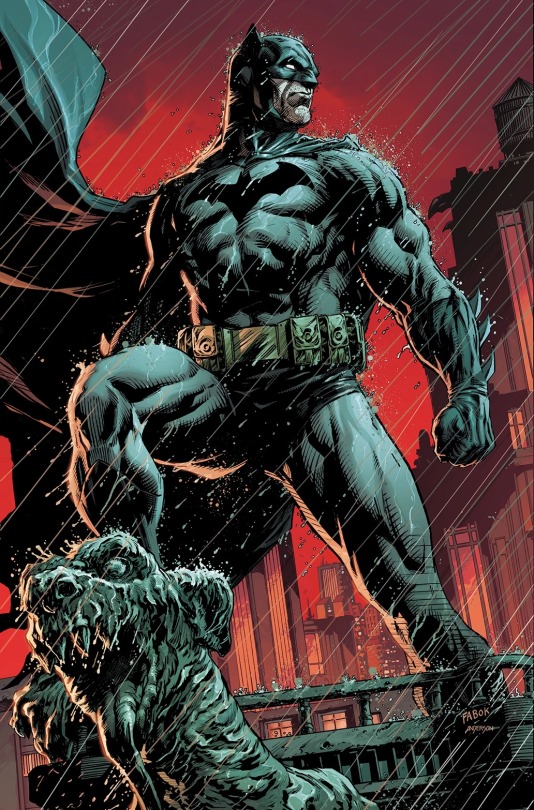
You only know who he is when you have dialogue with another character.
I say Dialogue, but it doesn’t necessarily mean spoken language at one another. Dialogue can mean fist fighting, playing tabletop games, talking to other people about the other, or even just a competition. The idea is to simply to compare and contrast both ideas.
If you want an example on how tabletop games serve as dialogue, watch the video “Well, Someone Had to Explain the Liar’s Dice Scene” by Lord Ravecraft
Another example, were we to retake Batman, you have him fight Joker. Who’s the embodiment of chaos and randomness.
In the following picture, you get far more information than the one previously shown. While the Joke fights with daggers and fake guns, Batman only uses his fists. He doesn’t use the tricks that Joker does. His serious demeanor, contrasted with Joker’s glee at the dangerous situation. The fact that Batman has a deathly grip on Joker’s shirt, while the Joker doesn’t, which shows a desperation to catch him.
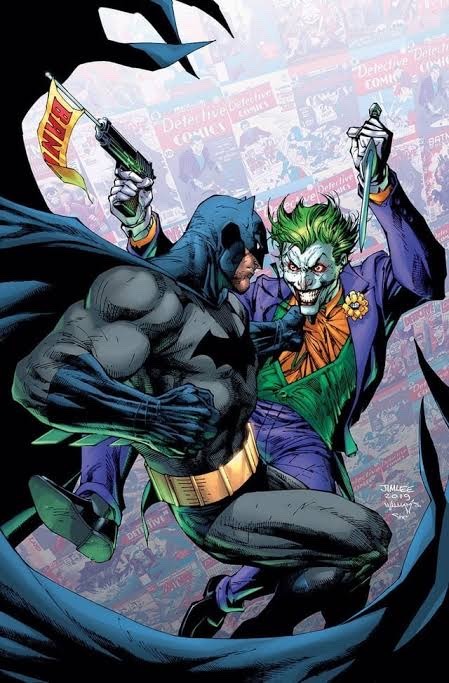
You are being shown, through a dialogue, who Batman is.
It’s so much easier and much more effective to explore a character through another character.
This is the reason why Shonen has a tendency to make incredibly good gay ships. If you want to explore Naruto’s personality, and his feelings of inferiority, you HAVE to have him interact with Sasuke.
If you wanna understand Hinata’s passion for volleyball, you have him enjoy himself the most with the only other crazy motherfucker who’s as obsessed with volleyball - Kageyama.
And I think that originally, Yana had this problem.
Sebastian was the protagonist, but she had little room to develop him as a character in the confines of the manor, dealing with random enemies.
She likely tried to create Grell as someone of the same stature as Sebastian. Someone who could be this other person to engage dialogue with and show or allude to his past a bit more.
The problem being that Sebastian didn’t care for his past. Or really, engaging with anyone. He sees everyone as below him, but when confronted with Grell who isn’t below him, he doesn’t wanna talk to her.
So you’re stuck in conundrum.
How do you have dialogue with a character, that as a character trait, doesn’t really wanna have dialogue?
Well, Grell also solves the problem. Because only the moment she gets him to start any semblance of a dialogue - is questioning why he’s serving Ciel.
And this is the moment when it’s perfectly cemented that the focus of the story is their relationship.
Why is Sebastian here? Why does he stay? What did he see in Ciel that made him want this extremely convoluted contract?
THATS the dialogue.
THATS the conversation we’re having in Black Butler.
We need to know Ciel because understanding who he is, let’s us know WHY /Sebastian/ is here.
Then slowly, with the introduction with the Undertaker, we find out Sebastian’s conflict.
Which is…
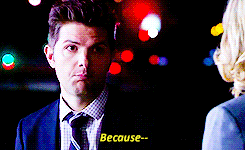
He’s scared of losing Ciel. It becomes apparent with the constant imagery of the Undertaker taking away Ciel and at some point even obtaining r!Ciel’s body, that he’s worried it might happen.
But he can only be worried that Ciel might be taken away if he wants to stay near Ciel.
And that’s his character arc.
Realizing that he actually likes Ciel, cares for him and the role he plays a butler that he doesn’t want this to end.
In the first chapters, he doesn’t feel a need to protect Ciel anymore than what’s strictly necessary. Just don’t die, that’s about as deep as his involvement in chapter 4 gets.
But by the Green Witch Arc, he feels a need to protect Ciel from ANY harm.
This is why I also said
3.- Their relationship is fundamentally a positive one.
In broad strokes, Sebastian to Ciel is the person who allows him to survive. He’s not worried about giving up his soul since he’s already dead. While Ciel to Sebastian, is someone who’s making him have fun. He’s slowly becoming more and more attached to Ciel and the life he has with Ciel.
Their relationship is not that of just a predator and prey, but also of master and pet.
In the terms that Black Butler itself would call: Sebastian is a wild wolf acting like a collared dog.
Ciel is aware that the wild beast will eat him at the end of the day, but if he clings hard to leash for now, he might just be able to have Sebastian maul his abusers.
Sebastian as a dog, currently finds that he enjoys being a chained dog.
(This is demonstrated in the Green Witch arc where he quite literally says, he doesn’t wanna be a wild beast and prefers to be a butler)
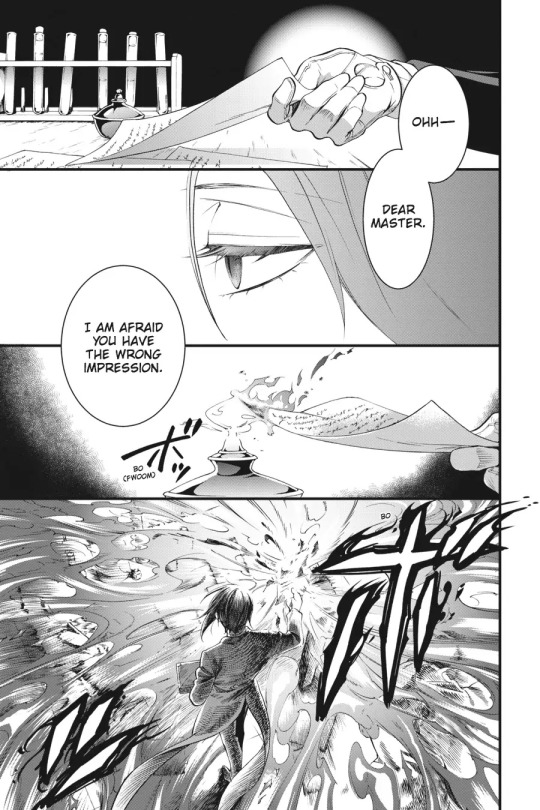
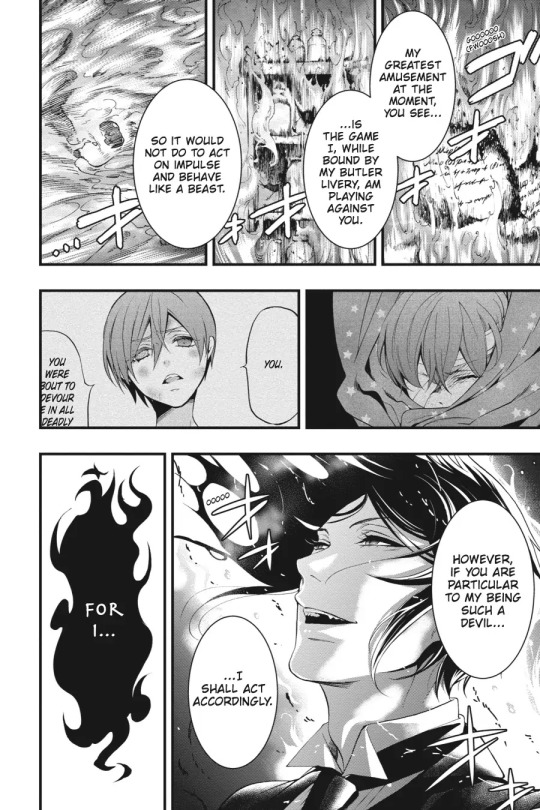
And much like the actual DOG Sebastian, Ciel constantly interprets his attempts to get close and protect him, as an act of aggression.
This push and pull of Ciel’s perception of Sebastian and Sebastian’s true motives is what feeds the story.
And the briefs interludes were that isn’t the case (what other people call the “plot”, but I would refer to as the connective tissue) such as Sullivan and Wolfram, the other servant’s past, the grim reapers and the like, serve as a parallel to Ciel and Sebastian relationship. Either to signify how they care for each other, highlight their weaknesses or fears, or explore how they feel.
It’s no surprise that Sullivan and Wolfram are parallels to Ciel and Sebastian. A sheltered sickly child who seeks the protection of a cold hearted machine that only knew how to kill, but who eventually found he cared for her genuinely.
Undertaker and Claudia’s relationship being heavily paralleled with them, even though we aren’t 109% sure what they had but heavily implied it was a romantic attraction from the undead supernatural creature and a Phantomhive.
Everything is a parallel.
That’s why, like the approach of the terrible original video, is flawed.
Trying to interpret Black Butler as action scene after action scene, with mystery after mystery with the only connective tissue being the mystery of who burned down the mansion - is missing the trees for the forest.
That’s not the point.
And if you’re too much of a prude to engage with gothic horror in its gothic horror game, I see little point as to why you even bother to engage with it at all.
A lot of people, including the person who create the video, simply refuse to acknowledge Black Butler IS the story of Sebastian and Ciel as a close and positive relationship, romantically and sexually charged. The reason for it being that they’re “put off” by it.
Part of me wonders how much that is genuinely true, and how much is just performative outrage. It’s like ignoring the fact that Cersei and Jami are in an incestous relationship and try to frame it as “platonic love”, because the idea of it is THAT off putting.
But regardless of that, if you don’t like the fact that it’s as canon as canon can get, I would reccomend you don’t engage with the story at all.
As I’ve explained, the entirety of the series is about them. If you refuse to see Sebastian and Ciel as, at the very least, a duo that cares deeply for the other - you aren’t reading Black Butler.
I have no idea what you’re reading.Perhaps your own biases and subconscious stigma with British aesthetic. At that point, watch the fucking British Royalty Gossip Magazine. You’d find more substance there.
Just don’t be like the person in the video, please? Don’t play dumb. Don’t ignore the fact that Yana is a Shotacon, don’t ignore the fact Sebastian is a hero, don’t ignore the fact that the entirety of the story is based on Sebastian and Ciel’s dynamic.
Because if you do, you are ashamed. You are ashamed of what this story is about. You don’t wanna engage with the text, you want to engage with yourself. You wanna project into Ciel whatever traumas and experiences you have, for the sake a vanity project, where you come out as the morally superior.
You don’t wanna talk about Black Butler, you wanna talk about how good YOU are. How you “don’t sin” by watching it “without all the gross unholy stuff”.
Which is the exact opposite of what BB is about.
So, if you don’t want to, save us all the humiliation fetish and leave.
775 notes
·
View notes
Text
(Reposting from twitter)
My POV as a Black fan that thinks Dot and Bubble's racism commentary is trash
Rewatched Dot and Bubble and I'm gonna break down from my POV as a Black fan why this episode didn't work for me & why it's an awful racism commentary. Long arse post incoming:
The whole "You should've noticed the cast was all white except for fifteen ha your bias is showing" doesn't work for a show that's been predominantly white for 60+ years. D&B casting has been the default for most of the show so its not abnormal enough to be a racial litmus test. An example is the Matt Smith era The only reoccurring character of colour in s5 (2+ appearances) is Liz 10. Artie n Angie in s7. 0 in s6. RTD's own era isn't fully safe either. For many eps Martha or Mickey are the *only* Black characters. Most POC are side characters or extras.
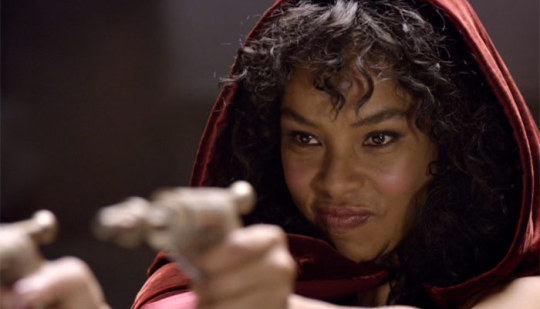
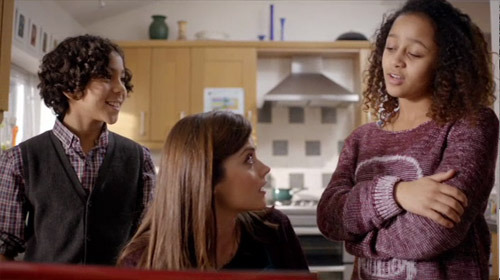
White fans should be aware of the predominantly white casting of the show but this late in the game feels cheap. Most of the show has gone through 100% white episodes including fan faves and it was never an issue back then bc it was beneficial. This is so hollow. Representing racists as cartoon caricatures SEVERLY underestimates the danger of white supremacy irl. White supremacy is system designed and constructed and rebranded over centuries. It is not accidental. People aren't racist bc they don't know they're racist because they *do* They know the system that oppresses POC, Black people especially, benefits them socially and financially and that is why they participate. Its not stupidity it's intention. That should've been the Finetime core not Lindy goofing around bc the arrows are gone or some shit.
Human Nature showed us racist young people that exercised this power bc they knew this. They may be children but they are still dangerous bc of their views. Martha knew this. The silly tech obsessed gen z angle erases this danger and that of actual gen z white supremacy
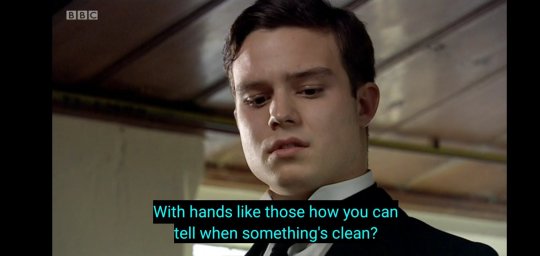
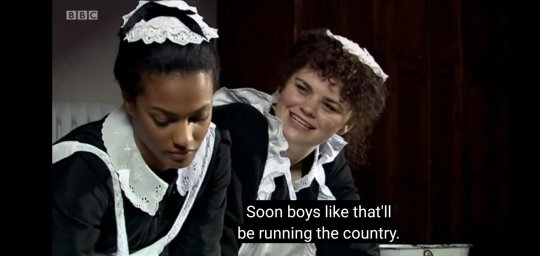

Instead of the camp goofy tone we could've gotten a serious focused episode. The slugs and millenial/gen z social media silly distracts from what could've been the main theme of colonisation instead of saving it for 10 mins of exposition at the end & scattering microaggressions. Saving Fifteen's racism scene for a goofy episode was a horrid idea. Spending 30 mins on representing racism as silliness then giving a dramatic dangerous score is the definition of tonal whiplash. Representing his oppressor as a blonde bimbo again does not take this seriously. Fifteen went to 1960s BRITAIN & got through it unscathed. Finetime is a fictional futuristic land but the racism of 1960s Britain was real. If anytime was right it could've been Devil's Chord. Distancing yourself from a panto villain is easy but addressing your history is hard.
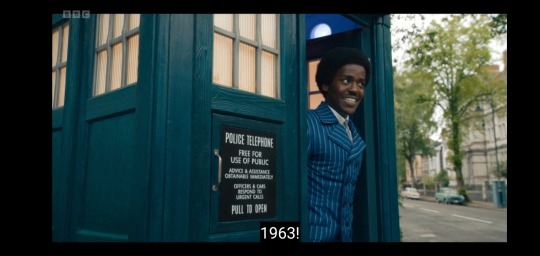
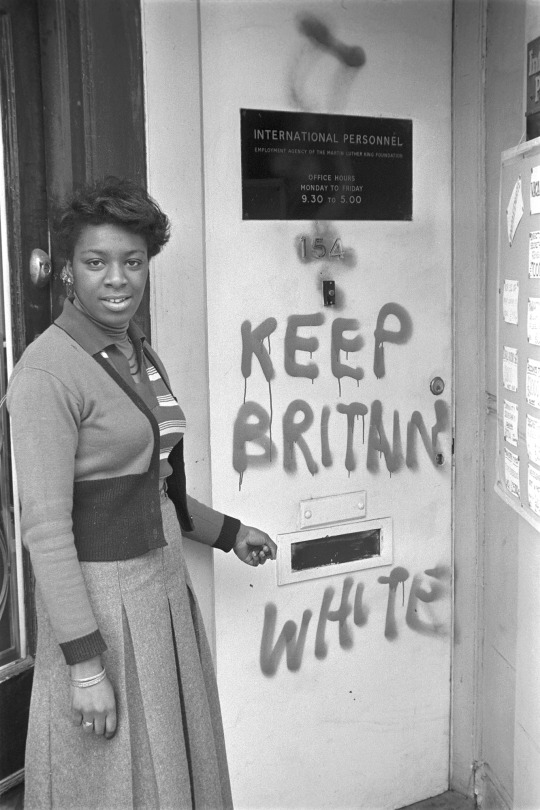
The scene itself is incredibly performed so I'll give Ncuti his flowers but what he used this skill for could've been so much more. Having his FIRST SCENE begging to save a racist is disgusting. It isn't Black people's responsibility to show compassion to people that want us dead. Yes the Doctor helps the baddies bc they care. But they're aren't ignorant to prejudice. The liberal anti racism of who is so jarring and why I still think Thin Ice is performative. When white people are angry at injustice it's radical. When it's Black people we're aggressive.
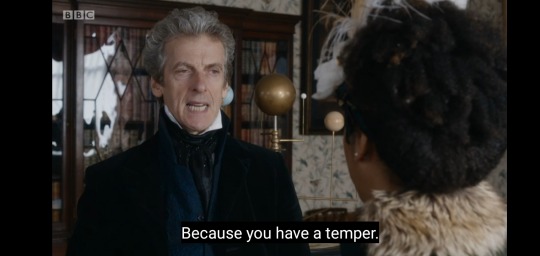
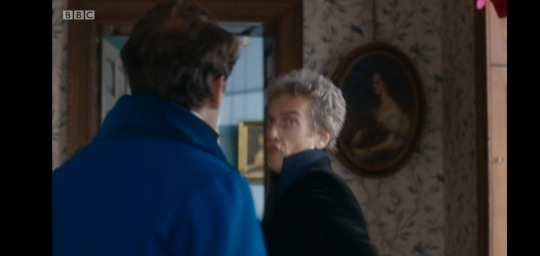
Respectability politics is a tool of white supremacy. That if one pleads and is nice enough they can earn liberation. What would white fans think of Fifteen if he DIDN'T beg Lindy? If your allyship with Black people depends on showing kindness to racists you are NOT an ally.
Next up is Ricky. It was established ALL Finetime citizens have white supremacist views yet Ricky September stans refuse to see him in any negative light. Just like Joan Redfern white dw fans refuse to see racism if a character is likeable. If nice guy Ricky's a racist, then anyone no matter the niceness can be racist too and that's a pill white fans aren't ready to swallow. If racism is systemic and not about individual character, then what's keeping them safe? What happens when YOU are under the microscope.
THIS is why we NEED Black writers in Doctor Who. The nuances, depth and complexity of the Black experience can only be told at it's best by Black creatives and not guessed, assumed or spoken over by white fans and white writers. It's okay to put ego aside and say you don't get it.
"Im white but I loved the Doctor's reaction" "I'm white and i thought the racism commentary was great" "I'm white but i-" Yet again, we have to sit through another round of white and non Black fans of colour dictating Black representation for us. I'm so fucking tired man. AGAIN IM YELLING FROM MY HILLTOP TO WATCH SHOWS BY BLACK WRITERS. Almost EVERY single theme in Dot and Bubble and frankly most of the show has been done WAY better in other media. RTD is not the authority on Black stories. We are. Always have been and always will.
Tl;dr Dot and Bubble is an unserious and tacky racism commentary. It's core message is drowned by more RTD Who camp. Don't tell me this episode was good at representating my own experience. It wasn't. S15 having Black writers isn't a need it's a must. Goodbye.
Reblog this version pls
#dw spoilers#doctor who spoilers#doctor who#rtd2 era#rtd2#antiblackness#fandom antiblackness#racism#fandom racism#rtd critical#anti rtd#fifteenth doctor#dw negativity#doctor who season 1#dot and bubble
649 notes
·
View notes
Note
Could you write a hero who's broke af but is at the villians mansion taking care of them and despite being broke af they get every medicine every grocery villian requires and villian just breaks? Also, vil calls hero 'love'
The villain was where the hero had left them - on the couch, staring at the black screen of their TV.
"Did you know — this will blow your mind — that you can actually turn that thing on?" When the villain turned their head to look at them, the hero pointed at the hilariously large screen. "Or so I've been told."
"Is that so?" The villain's attention came back to the screen and the hero couldn't help but wonder if the villain's misery was growing from day to day.
The hero knew their nemesis loved to be active. They loved exercising, they loved causing trouble.
But ever since the house arrest and the ankle monitor was put on them, they had acted nearly depressed. If the hero hadn’t known them, they would have guessed it was due to their injuries.
A very messed up clavicle and a horribly cracked ankle were just two components of the entire cruel picture of bruises. According to the city, the hero was "the only person strong enough to detain" the villain.
Which didn't really bother the hero as much as the media wanted the public to believe. Hell, there were even petitions for people to sign to "protect" the hero from this incredibly dangerous mission that felt more like a vacation than anything to the hero themselves.
"You look tired," the hero said. "Would you like to take a nap?"
They left the groceries in the dining room and walked up to the couch but the villain was silent. Their eyes were still staring at the dark reflection of themselves. Without hesitation, the hero sat down next to them and debated if they should try to put their hand on the villain's thigh to comfort them.
Against their better judgment, they decided not to.
"You've been looking at that TV for like…30 minutes?" the hero said instead. "Have you eaten the breakfast I made for you?"
They hadn't. The hero had checked - but it didn't seem to matter. The villain didn't say anything.
"Look, I understand this isn't what you wanted. But I am trying to take care of you as best as I can. If you have any problems with your shoulder or if there's something else..."
Suddenly, the villain turned their head and looked at the hero. Under their eyes, the spreading dark circles were a little too visible to the hero.
"I..." The villain sounded absolutely exhausted. "I had this nightmare again."
"The one with me?"
"Yeah, but it was different, it's...ah, forget about it, love. It's stupid," the villain said. They leaned back against the pillows of the couch and closed their eyes as if they were concentrating on something.
However, the hero did notice the soft blush on their cheeks.
"That's for me to determine."
"It's really stupid." The villain looked at them again and when the hero looked into their eyes, they were sure they would have missed the villain's next words. Almost embarrassed, they stared at their own hands. Getting lost in the villain's eyes came a little too easy to them. It wasn't like the hero wanted or provoked it. It just happened. And there was nothing they could do about it.
After all, this was their job. They were getting paid to be here, even though it left them with a really bad aftertaste. Somewhere deep down, they wished they could have done this without receiving payment in the first place. For the sake of compassion.
"Stupid is okay," the hero said. "I think talking about it could help, I think...I think you carry a lot of stuff around and never got to share it with anyone. That's why it is gnawing on you. Especially now that you're injured and rely on someone else."
"You're my enemy, so I shouldn't tell you in the first place," the villain argued.
"Your dream was about me, so technically-" the hero raised an index finger "-I have the right to know about it."
The villain narrowed their eyes. "That's not how it works, love."
If the villain didn't want to talk, the hero supposed they couldn't make them. Obviously, they were familiar with a lot of interrogation techniques but the villain was neither a suspect nor a threat at the moment. The hero sighed softly.
Work occupied their own mind to a nearly worrying degree. Money was a big issue, big enough to give them troubles with falling asleep at night. They guessed that was their own little package to carry around.
But they didn't think it was comparable to the villain's. What they had read in the reports about their childhood...eventually, the hero had stopped reading because it was too painful to even grasp.
"I, uh...got you some stuff. Some medicine, some cookies. Nothing big, really."
The villain's eyes widened.
"Did you pay with the cash I put on the table for you?"
"No, I used my credit card," the hero said. "Wait, just let me..."
They stood up, grabbed the grocery bag and sat down on the carpet of the living room, right in front of the villain. They unpacked every single item carefully and explained how heroically they had fought for the last box of chocolates (which wasn't nearly as dramatic as they framed it to be) or how they nearly died of a heart attack when their card got declined the first time (they merely sweated a little bit more).
"You bought all of this for me?" The villain stared at the chocolates, the painkillers. It seemed like their fingers were shaking a little.
"Well, I wouldn't mind if you shared."
And then, finally, the villain smiled gently.
"You're so stupid." Before the hero knew it, their enemy's fingers pushed hair out of the hero's vision. "You should have used the cash, love."
The hero stared up at them, one of their arms still in the sling, the other still hovering there, their fingers brushing the hero's jawline.
"I wanted to buy this for you. With my own money," the hero said. No. They admitted it. "I know it's not much, but I wanted to make you a little happier."
"I'm not unhappy here with you," the villain said. "You don't make me unhappy. This dream was just a lot and my shoulder really fucking hurts. That's all."
They pulled away and suddenly, the hero felt a little colder. Once again, they feared this wasn't all there was to it.
But it also wasn't their place to poke around.
"Tell me if there is anything I can do for you, though. Okay?"
"I will," the villain said. The hero stood up, not entirely sure if they were actually helpful. They were good at tending wounds but the villain had problems with asking for help. They were good at cooking but the villain didn't seem to have any appetite. They took in a deep breath and before they could reach for the groceries, the villain grabbed their hand. "Okay, I...I kissed you in my dream."
The hero's eyebrows jumped up. "Oh?"
"And it's scaring me. I can't afford those feelings. I can't...I shouldn't want you."
"Shouldn't?"
"I shouldn't." The villain let go and stood up. They cleared their throat. "Eh...do you need help with the groceries?"
And that was the end of that conversation.
For now.
#writing snippet#heroxvillain prompt#heroxvillain snippet#heroes and villains#hero#villain#hero x villain#heroxvillain#request#an answer for an ask
188 notes
·
View notes
Text
Idk everyone can take what they wish from media, but for me the moral of “Frankenstein” was not that Victor is the true monster or even that he’s necessarily stupid. Makes me sad to see a story fundamentally about humanity being reduced to black and white. How can one recognize that the monster is unjustly robbed of humanity and compassion and then rob Victor of that same thing. Lol
166 notes
·
View notes
Text

MAGA - Jordan Neely had it coming.
Also MAGA- Ashli Babbitt is a martyr.
Racists will continuously move the goalpost.
Because they just want a reason to be racist.
They will never be satisfied.
They will praise the evil that yts do and would rather eat glass than condemn the hateful actions their fellow children of the chalk do
Because if they truly hated Black people they would leave us the fcuk alone.
We don't fcuk with them. They bother us!
#jordan neely#daniel penny#blacklivesmatter#journalism fail#media bias#black lives matter#reblogview post#blm#homelessness#sigh#true crime#these pos motherfuckers refuse to see the compassion of black folks who are mentally ill and homeless#if you don't see the compassion of them you can happily go die in a fire#seriously kill yourself rn#you disgusting#selfish#disgusting fuck#if you agreed with this shit#you can die in a fire#i'll even light you the fuck up#on god#And I’m so serious
17 notes
·
View notes
Text
Moral purity and imaginative resistance as influencing factors in fandom 'anti' attitudes
Jessica Black et al.'s 2019 experiment on the correlation between enjoying dark/villainous characters, personal morality and purity beliefs, and imaginative resistance is so interesting when applying it to anti culture and fandom.
They created a Dark Character Scale where participants self-selected how strongly in agreement or disagreement they were with a series of statements about dark or villainous fictional characters. Some of these questions were the following:
"I enjoy films and books that feature main characters that choose morally questionable actions."
"I can often understand where the bad guys in fiction are coming from."
"My favourite fictional characters are morally ambiguous and often do horrible things."
They then utilised the Moral Foundations Questionnaire (Graham et al. 2011) to see what participants considered important when deciding on whether something is morally right or wrong, for example:
Whether or not someone suffers emotionally
Whether or not someone did something disgusting*
Whether or not someone was cruel
Whether or not someone was denied [their] rights
Whether or not someone acted in a way God would approve of*
as well as how strongly participants agreed or disagreed with statements such as:
Compassion for those who are suffering is the most crucial virtue
People should not do things that are disgusting, even if no one is harmed*
It can never be right to kill a human being
I would call some acts wrong on the grounds that they are unnatural*
Respect for authority is something all children need to learn.
One of the final scales participants used was the Black & Barnes (2017) Imaginative Resistance Scale. This is basically used to gauge how resistant the reader is to enjoying or consuming fictional content that contains characters, situations, or worldbuilding that they personally find morally disagreeable. They had to select how strongly they agreed/disagreed with questions like:
Reading books where bad things are depicted as morally acceptable makes me feel dirty
I just can't go along with a story when it violates my beliefs about morality
At times it feels like the author of a book is asking me to endorse actions that I know are wrong
Some things just shouldn't be done, even within a book
I sometimes cannot go along with a story when the "good" characters do morally reprehensible things
Sympathising with immoral characters makes me feel immoral myself.
Unsurprisingly, analysis of the data revealed that there was a strong correlation between disliking or not enjoying dark fictional characters or villains and having a higher purity morality score and more imaginative resistance.
They performed this test in three studies done on three completely different demographics - the first being mostly liberal women from social media sites, the second being mostly younger conservative college undergrads, and the third being adults split 50/50 in gender recruited from MTurk. All three studies showed that having stronger imaginative resistance and higher purity morality scores is directly linked to a lower score on the DCS - meaning that they would like or enjoy dark fictional characters and their actions less.
This tracks pretty well with what can be seen in the emerging anti culture within fandom:
Self-identified 'antis' are likely to agree strongly with the statements from the Imaginative Resistance Scale, and are more likely to score highly on the questions in Moral Foundations Questionnaire that are specifically demarcated as being concerned with purity (marked above with an asterisk *). This means that they are also, according to these studies, much more likely to disagree with dark fictional characters and their actions.
There is also a very interesting point in one of the discussions areas where Black et al. state "It is worth reiterating that the participants in Study 2 tended to be more conservative, and therefore potentially more likely to have greater concerns about moral purity" which tracks with what people in fandom have been saying about antis parroting conservative/puritan talking points and arguments.
What I find the most interesting is the following statement:
"However, moral purity and imaginative resistance are consistently positively correlated, both in the current studies and in prior research ... and are both likely to reflect a fear of moral contagion that would discourage people from identifying with and liking [dark fictional characters]."
This, when applied to antis, suggests that antis may harbor the subconscious belief that enjoying dark fictional content, and therefore being a 'proshipper', is literally psychically contagious. They may view this as some kind of moral disease which is spreading and infecting fandom, which could explain why they are so vehemently against it - fear. This is the puritan Moral Panic all over again.
Black et al. also discuss theories of fictional engagement and parasocial relationships/identification, and whether these studies is relevant to "when and for whom fictional engagement could have the potential to negatively affect real world attitudes or behaviour".
Jessica Black and Jennifer Barnes often publish articles together and have some incredibly interesting reading of morality and fiction that I'd be interested to see applied to fandom and anti culture in an academic setting. Perhaps some people in the field like Samantha Aburime (@rainystudios) are already looking into it - and I'm hoping I can do the same in my studies.
355 notes
·
View notes
Text
Plurality on the Disc
CW: Fatphobia, euthanasia
One thing you can always say about Pratchett was that he did not believe in prejudice. The man saw the world through a lens of satire and yet in all things he attempted to see the humanity in all things and tried to bleed that compassion into the world he created, especially with the modernization of the central city, Ankh Morpork.
Pratchett's works as early as the 90s were showing positive trans representation in Cheery Littlebottom, a dwarf who opts to present femme within a culture that treats displays of gender other than the "default", without acknowledging the inherent bias that the "default" gender presentation within Dwarf culture is masculine. It seems Pratchett was able to display "Male or Political" as a fallacy long before toxic gamer culture.
Sensing that the audience may have found this too subtle he went on to write Monstrous Regiment in 2003, a story about a group of women who take up arms, disguise their gender and live as men to fight in a war. As many things on the Disc it was written with fantasy and satire in mind and yet was incredibly detailed in historical accuracy. As trans-folx continuously remind: "We have always been here"
Today's topic, though, is on plurality. Typically in Media, Myself and I essays we focus on depictions of DID with an emphasis on psychopathology. Pathology and mental illness do not really factor into the fantasy world of Discworld. One need only look at the "Sideflashes" depicted in Monstrous Regiment, those being moments where a vampire character has traumatic hallucinations of the Vietnam War of our world, to know that Pratchett is more interested in satirizing the genre mediums he is working within rather than depicting accurate portraits of real mental illness.
That said, in one of his final books, Thud! Pratchett did have a character with two distinct personalities who could withhold information from one another say "It's supposed to be an illness, but all I can say is, we've gotten along well."
Pratchett always leads with compassion and in all of his work he does his research. Though he never wrote much about the supposed illness mentioned in Thud!, he has written plural characters and we're going to focus on one right now.
The books in question are Maskerade (1995) and Carpe Jugulum (2003). These books heavily feature the characters Agnes Nitt and Perdita X Dream.

The first of the two stories is a parody of The Phantom of the Opera with a heavy emphasis on the real life stress and drama behind the scenes of any stage performance. A must read for any theatre kid who wishes to see 'the show must go on' taken to ludicrous extremes.
Agnes is a young witch who has talent as a singer. So much so that she is able to sing in harmony with herself. She decides to move to the big city and join the opera house in hopes of turning her talents to become a star.
Agnes is a prim and proper young witch, raised to think and act a certain way. The problem is, of course, she wants to act in ways unbecoming of who she is perceived as. So growing up when she misbehaved and acted outside of these rigid expectations she would compartmentalize all of her behaviors into Perdita X Dream, "the thin woman trying to get out"
She'd caught herself saying 'poot!' and 'dang!' when she wanted to swear, and using pink writing paper.
She'd got a reputation for being calm and capable in a crisis.
Next thing she knew she'd be making shortbread and apple pies as good as her mother's, and then there'd be no hope for her.
So she'd introduced Perdita. She'd heard somewhere that inside every fat woman was a thin woman trying to get out[3] so she'd named her Perdita.
She was a good repository for all those thoughts that Agnes couldn't think on account of her wonderful personality. Perdita would use black writing paper if she could get away with it, and would be beautifully pale instead of embarrassingly flushed. Perdita wanted to be an interestingly lost soul in plumcoloured lipstick. Just occasionally, though, Agnes thought Perdita was as dumb as she was.
It is not uncommon for those with dissociative disorders to have these idealized personas that take on lives of their own. Though the Fae beauty known as Dawn is a name and identity that I have forged through decades of actualizing, my humble roots will always be the performance of what we thought a strong and capable woman would look and sound like. The fact we borrowed the blueprints is neither here nor there.
In moving to the city of Ankh, Agnes decides that she is free of those who have told her what to do and able to live as she has always desired. She adopts the name Perdita as her own and signs up to sing.
After moving in to the opera house she becomes entangled in the plot of Phantom of the Opera. The central story of the book is a retelling of PotO but with the Disc's patented absurdity added on and Agnes being used as a perspective character. At a point Christine, the only woman capable of exclaiming a whisper, switches rooms with Agnes because she is keeps hearing voices while she's trying to sleep. That night the voice from behind the mirror calls out into the darkness, thinking it is speaking to Christine, and speaks to Agnes instead.
There is makes it very clear as to why Agnes cannot be the central figure of the book.
Agnes pulled the bedclothes up higher. 'In the middle of the night?!'
'Night is nothing to me. I belong to the night. And I can help you.' It was a pleasant voice. It seemed to be coming from the mirror.
'Help me to do what?!'
'Don't you want to be the best singer in the opera?'
'Oh, Perdita is a lot better than me!!'
There was silence for a moment, and then the voice said: 'But while I cannot teach her to look and move like you, I can teach you to sing like her.'
Agnes stared into the darkness, shock and humiliation rising from her like steam.
Fatphobia is real and is on The Disc, I am sad to say.
But it is after this incident that Agnes begins to recognize the prejudice that has been levied at her the entire book and the prim and proper Agnes politely thinks calm and pleasant thoughts when she is insulted, it is Perdita who thinks rude words.
This gets worse as the plot goes on and the managers cast Christine as the lead and have Agnes sing the lead from the chorus.
The humiliation and compartmentalized resentment continues on and...
What she was about to do was wrong. Very wrong. And all her life she'd done things that were right.
Go on, said Perdita.
In fact, she probably wouldn't even do it. But there was no harm in just asking where there was a herbal shop, so she asked.
And there was no harm in going in, so she went in.
And it certainly wasn't against any kind of law to buy the ingredients she bought. After all, she might get a headache later on, or be unable to sleep.
And it would mean nothing at all to take them back to her room and tuck them under the mattress.
That's right, said Perdita.
Passive Influence is a term used for when a part/alter pushes for action while another part is fronting in the system.
In this example Perdita is steering Agnes to perform actions that are not congruent with her nature and her beliefs. Agnes is not capable of plotting revenge against someone and enacting a scheme and so even while performing the actions she is rationalizing to herself that she is not actually doing anything untoward because it is not in her nature to do such a thing.
The traits exist but they do not belong to Agnes and at this point she has not yet realized that the Perdita identity that she has formed is capable of asserting her own will.
The formation of a dissociative disorder typically occurs when a child is in a situation of constant trauma and need to adapt contradicting realities in order to function. Most common of which is the contradiction of needing protection, nurture and safety from the caregivers who provide terror and pain. To function within that framework a young mind will compartmentalize experiences in order to maintain a reality where both these truths are compatible.
Agnes, in part due to the prejudice she faces for her weight, has to have a wonderful personality. Her acceptance within society requires her to act the part and be a kind and sweet girl with a wonderful personality. Always be the best version of herself in spite of her looks because without that wonderful personality she will only be regarded as a large woman and will be discarded.
So she puts away all the thoughts that run contrary to that narrative. Anything that doesn't fit in the Nice Girl persona.
Aren't you just tired of putting up with it, though? Don't you want to go apeshit?
If you were someone like Agnes Nitt, wouldn't you long to be someone as dark and mysterious as Perdita X Dream?
As the book goes on Perdita continues thinking things from behind Agnes' eyes and the narrative begins describing their differing perspectives. The schism growing wider and wider throughout the story.
At the start of the book, when Perdita began becoming more prominent, the prose would say "Perdita thought a rude word" then, as in the passive influence section, "Perdita said" is included in the text. Later still Agnes and Perdita converse within the prose.
The candle burned with a greenish-blue edge to the flame.
Somewhere, said Perdita, there was the secret room. If there wasn't a huge and glittering secret cavern, what on earth was life for? There had to be a secret room. A room, full of. . . giant candles, and enormous stalagmites. . .
But it certainly isn't here, said Agnes.
The further on the story goes the more comfortable both character and author are in sharing the back and forth between Nitt and Dream.
If Maskerade was the introduction to the concept then Carpe Jugulum (2003) is where Agnes Nitt and Perdita X Dream's shared mind and body become central figures in the story and are allowed to explore themselves a little more. In the previous story Perdita is treated as where Agnes puts all of her unseemly actions and desires.
In Carpe Jugulum it is treated very emphatically as a dissociative disorder where two parts of the same mind share control over the same body.
She simply sang in harmony with herself. Unless she concentrated it was happening more and more these days. Perdita had rather a reedy voice, but she insisted on joining in.
Those who are inclined to casual cruelty say that inside a fat girl is a thin girl and a lot of chocolate. Agnes’s thin girl was Perdita.
She wasn’t sure how she’d acquired the invisible passenger. Her mother had told her that when she was small she’d been in the habit of blaming accidents and mysteries, such as the disappearance of a bowl of cream or the breaking of a prized jug, on “the other little girl.”
The tone is set early on with Pratchett working to codify that which already existed by including Agnes putting the pieces together as an adult based on what others had told her she did as a child, something all too common with those with dissociative disorders.
The pair are living in harmony for the most part, Perdita enjoys getting to sing with Agnes and is fiercely defensive of her host. She does not enjoy it when people are mean to Agnes. It is why she focused much of Maskerade on scowling at Christine. Though Perdita herself seems to enjoy bullying Agnes, as she does delight in cruelly calling her a lump.
The story this time is about a group of Modern Sexy Vampires moving in to the witches' town and deciding to take over. Much of the book's satire is a comparison of the Anne Rice and World of Darkness ethos on vampire lore and comparing it to the more gothic and classic depictions such as Nosferatu and Bram Stoker's Dracula.
As well as the complete and utter violation that is "treating people like things".
The story also introduces Mightily Oats (who Perdita will squee about having a cool ponytail), a parody of the catholic vampire slayer trope. He, himself, has a "rifted personality" like Agnes and Perdita due to his adherence to the contradicting commandments and beliefs held within the religious texts of his faith, Om.
Unfortunately, Perdita's alliance with Agnes is harmed when the vampires move in and Perdita finds herself largely attracted to them. Perdita is the very essence of a scene kid, after all, she'd listen to Evanescence if they existed on The Disc. Throughout the early phase of the vampire plot Perdita finds herself internally shaking Agnes and screaming petulantly at her that she is fumbling the ball so hard when faced with them.
Ask him his name! Perdita yelled. No, that’d be forward of me, Agnes thought. Perdita screamed, You were built forward, you stupid lump—
I am certain many reading this will empathize. I certainly do.
But all too quickly the plot of the vampires is revealed and they begin using their vampire hypnosis to control the town. All while Perdita is screaming rebellion and demanding they be given garlic enemas.
Perdita is unimpacted by the mind control. What's worse is that the vampires can read minds and can tell there's something odd about Agnes but not quite what.
Ur…” She stopped it turning into a giggle. “Not really. Not very well…”
Didn’t you listen to what they were saying? They’re vampires!
“Shut up,” she said aloud.
“I beg your pardon?” said Vlad, looking puzzled.
“And they’re…well, they’re not a very good orchestra…”
Didn’t you pay any attention to what they were saying at all, you useless lump?
“They’re a very bad orchestra,” said Vlad.
“Well, the King only bought the instruments last month and basically they’re trying to learn together—”
Chop his head off! Give him a garlic enema!
“Are you all right? You really know there are no vampires here, don’t you…”
He’s controlling you! Perdita screamed. They’re… affecting people!
“I’m a bit… faint from all the excitement,” Agnes mumbled. “I think I’ll go home.” Some instinct at bone-marrow level made her add, “I’ll ask Nanny to go with me.”
Vlad gave her an odd look, as if she wasn’t reacting in quite the right way.
Then he smiled. Agnes noticed that he had very white teeth.
“I don’t think I’ve ever met anyone like you, Miss Nitt,” he said. “There’s something so… inner about you.”
That’s me! That’s me! He can’t work me out! Now let’s both get out of here! yelled Perdita.
Up until now Perdita has been a very internal experience for plurality, itself a rarity within fiction. Perdita never fronts in the entirety of Maskerade. She is a sharp and judgmental voice in the back of Agnes' head and shaped much like her repressed desires.
After escaping the clutches of vampire mind control and escaping from the dangerous circumstance Perdita yanks control of the body and outs herself to fellow witch Nanny Ogg, leading to the first time either Nitt or Dream have had to describe their situation to someone outside the body.
“It’s all right,” said Agnes. “It’s me again, Agnes Nitt, but…She’s here but… I’m sort of holding on. Yes! Yes! All right! All right, just shut up, will y—
Look, it’s my body, you’re just a figment of my imagina—Okay! Okay! Perhaps it’s not quite so clear c—Let me just talk to Nanny, will you?”
“Which one are you now?” said Nanny Ogg.
“I’m still Agnes, of course.” She rolled her eyes up. “All right! I’m Agnes currently being advised by Perdita, who is also me. In a way. And I’m not too fat, thank you so very much!”
“How many of you are there in there?” said Nanny.
“What do you mean, ‘room for ten’?” shouted Agnes. “Shut up! Listen, Perdita says there were vampires at the party. The Magpyr family, she says. She can’t understand how we acted. They were putting a kind of…’fluence over everyone. Including me, which is why she was able to break thr—Yes, all right, I’m telling it, thank you!”
“Why not her, then?” said Nanny.
“Because she’s got a mind of her own!
[…]
Nanny rubbed her chin, torn between the vampiric revelation and prurient curiosity about Perdita.
“How does Perdita work, then?” she said.
Agnes sighed. “Look, you know the part of you that wants to do all the things you don’t dare do, and thinks the thoughts you don’t dare think?”
Nanny’s face stayed blank. Agnes floundered. “Like…maybe…rip off all your clothes and run naked in the rain?” she hazarded.
“Oh yes. Right,” said Nanny.
“Well…I suppose Perdita is that part of me.”
“Really? I’ve always been that part of me,” said Nanny. “The important thing is to remember where you left your clothes.”
This is the compassion in Pratchett's writing I'd mentioned. In this story Perdita is revealed to be part of Agnes and though Nanny Ogg is confused and a little ignorant of the whole affair, going as far as to yell "is she treating you alright in there?" into Perdita's ear, she is caring and understanding. In Maskerade Nanny was the one person in Lancre who accepted Agnes changing her name to Perdita, reasoning that "people ought to call themselves what they want."
In approaching the abnormal circumstance with compassion in the fiction it helps those reading get a broader and better understanding of how to be kind and treat those impacted in real life.
Also, as a side note, Agnes yelling at Nanny while "currently advised by Perdita" may not be an overt piece of representation but there is a concept called Blending within plurality. It's not mentioned in textbooks I've read but is often discussed in support communities. At times when two parts are co-conscious in front their traits will become a little blended.
In a way parts of a dissociative system are simply a way of storing traits necessary to function but dividing them to prevent emotional harm and damage or to maintain a form of continuity of self. To give an example we were ejected by our caregivers and internalized it as our own fault for being undesirable so part of us cannot fathom doing anything which would make us disposable and unlikable but our circumstances required becoming cold and focused for survival and so the sweet kind and lovable empathy driven part and the cold and angry survival part are kept in separate boxes. Likewise we have trauma related to eroticism but there is still an attraction to such material within us and so in order to function I handle that aspect of our life and shelter the others from being impacted. At first due to heavy dissociation and denial and these days due to practice in therapy allowing us to let parts "opt out" and retreat inwards when they do not want to be involved in what is happening with the body.
In a way blended parts are closer to what a person would be like if they were singlet, though blurring does not often involve the entire system if there are more than 2 parts.
And though I say 'closer', I do not mean entirely as typically when blended people are in an activated state. In the above case where Perdita and Nanny had triggered Agnes' frustrations about her weight being bullied, she was unable to control the emotion of her reaction.
We refer to such days when we are blended and incapable of controlling our emotional reactions as "thin skinned days". They were more common prior to diagnosis.
As the story continues the pair need to see-saw their consciousness to avoid vampire mind control and we are treated to moments of Agnes being the "invisible passenger" in the situation, going as far to show her ability to focus attention on reading is not as sharp as Agnes'. Something I can assure you is quite true within parts of a dissociative system. Goodness knows Cammie would never have the patience to do the reading and typing necessary for these essays.
The story continues on and though there are moments of casual misunderstanding which are a par for the course in such tales, such as Nanny telling Perdita to "give Agnes her body back, you know it's hers really--" before knocking her out to ensure Agnes has control. They throw out lines like:
“Yes, that’s Agnes,” she said, standing back. “Her face goes sharper when it’s the other one. See? I told you she’d be the one that came back. She’s got more practice.”
And let me say, when someone knows you and loves you enough to recognize a part by the way they wear their face alone, it's something. I am simply incapable of reading a moment like that and not breaking into a smile and thinking of the many times our long distance love has tried to explain how she can just tell without a word when we have switched.
But as always. Pratchett leads with compassion. Where Nanny Ogg says that she thinks people should be called what they want to be called in Maskerade, regarding Agnes' wish to be called Perdita (not Perditax), it is Granny Weatherwax the beating heart and soul of the Discworld who says it best
Ah...one mind, split in half. There were more Agneses in the world than Agnes dreamed of, Granny told herself. All the girl had done was to give the thing a name, and once you give the thing a name you give it life...
Once you give a thing a name, you give it life.
That is compassion. To not fully understand something and how it forms and how it presents, but to respect it all the same. To know it has a form and should be treated as real because by virtue of being named it is real.
That is what so much of Pratchett's work is focused on. The humanity of seeing others as they wish to be and respecting them. It's such a low bar to clear in our world and yet sometimes it really does need to be emphasized.
Typically when Granny says something it's from the perspective of age and wisdom. It may not always be without bias but it is with a weight of knowledge and respect.
The final book in the series contents with Sir Pratchett's knowledge of his own death. He knew for years. He even did a documentary on medical aid in dying. He poured it all into depicting a tale that includes Granny's death.
The works of Terry Pratchett have long been a companion in our life. We've been reading them our entire life. To this day we have refused to read beyond Granny's death scene in Shepherd's Crown. We broke down crying when we saw the "I ATE'NT DEAD" call back. We couldn't pick up the book again after that.
It's too difficult to think that one of the voices that taught us morality is gone from this world. Our tag for Discworld is GNU Terry Pratchett. As long as the name is spoken he is never really gone.
As long as Shepherds Crown still has pages yet unread, the book series isn't really over.
-
For more of my essays on positive DID representation in media, please check out my Media, Myself and I tag.
#dawn posting#media myself and i#discworld#gnu terry pratchett#did#plurality#agnes nitt#perdita x dream#media essays
171 notes
·
View notes
Text
instagram
newsone_official The still-unidentified white man who killed #JordanNeely by placing the homeless and hungry Black man in a deadly chokehold on a #NewYorkCity subway train for a reported 15 minutes on Monday is rightfully getting the brunt of attention for the brazen vigilante killing.
But to be sure, he was not alone. Far from it.
In fact, it’s safe to say that the reported 24-year-old #Marine veteran who took the law into his own hands by fatally attacking Neely was aided and abetted by at least two men, video footage from the #homicide scene in the D-line subway car confirms.
Other people are shown standing by and doing nothing, but the aforementioned two men actively assisted the prime suspect by helping to restrain Neely, likely making it easier for him to be killed.
Little has been said about them.
-----
UPDATE [Swipe ↔️]:
Multiple social media accounts claim to have identified the man who killed a homeless Black man aboard a New York City subway train on Monday.
Reports began surfacing late Thursday night that a man named #DanielPenny from #LongIsland is the same person who employed a deadly chokehold on Jordan Neely on the F-line subway car in lower #Manhattan.
The reports were accompanied by a number of old photos and screenshots purportedly of the reported 24-year-old Marine and at least one apparent online bio.
Independent journalist #TaliaJane tweeted that “Daniel Penny, 24, a Queens resident from West Islip, NY, choked Jordan Neely, 30, on a northbound F train on Monday afternoon.”
Get MORE on this story right now at #NewsOne.com | 🔗 in bio
#Instagram#Fuck Daniel Penny.#Homeless people need compassion and help.#jordan neely#daniel penny#blacklivesmatter#journalism fail#media bias#black lives matter#reblogview post#blm#homelessness#sigh#true crime#these pos motherfuckers refuse to see the compassion of black folks who are mentally ill and homeless#if you don't see the compassion of them you can happily go die in a fire#seriously kill yourself rn#you disgusting#selfish#disgusting fuck#if you agreed with this shit#you can die in a fire#i'll even light you the fuck up#on god#And I’m so serious
1 note
·
View note